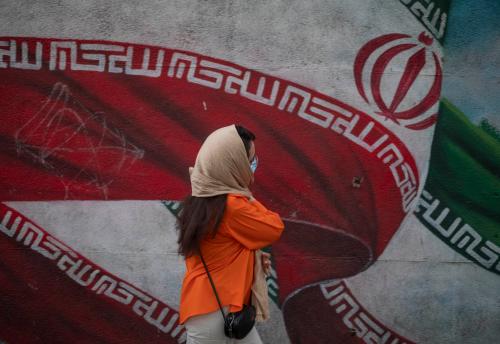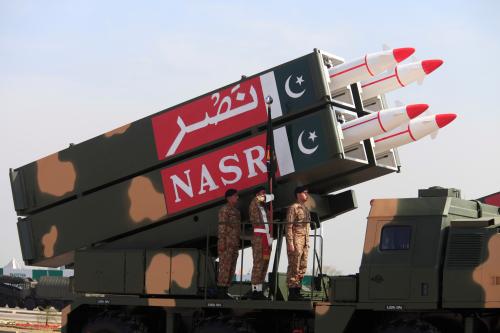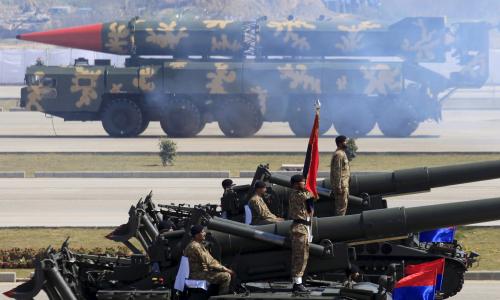Senator Carper, and members of the Committee, I am pleased to again share my expertise with the Senate. I have written about Pakistan since the mid 1960s, visited it regularly since 1977 and have written two books on Pakistan: The Pakistan Army (1985) and The Idea of Pakistan (2004). I dealt with the Pakistan nuclear weapons program during my two years as a member of Secretary Schultz’s Policy Planning Staff in the Department of State. As you are aware, some aspects of the Pakistani nuclear program can only be discussed in classified format, but there is enough publicly available material to come to several conclusions about its security and safety.
Pakistan used to be an important state because of its assets, but it is now important because of its problems. I am sure you are aware of Pakistan’s past reputation as a moderate Muslim state, but it has become virulently anti-American, it was the worst proliferator of advanced nuclear and missile technology and it continues to harbor—partially involuntarily—extremists and terrorists whose dedicated mission is to attack the United States.
Pakistan’s nuclear capabilities present at least four challenges to American policy:
- There is a small but real possibility of the next India-Pakistan crisis escalating to nuclear levels.
- Pakistan may decide, as a matter of state policy, to extend a nuclear umbrella (or engage in nuclear sharing) with one or more Middle East states, especially if Iran acquires a nuclear device.
- There is a hard-to-quantify risk of nuclear theft. Pakistan has a home-grown personnel reliability program, but even this could be circumvented in a determined conspiracy.
- There is some small chance that should Pakistan unravel, that its nuclear assets will be seized by remnant elements of the army for political, strategic, or personal purposes.
While nuclear proliferation or nuclear theft should not be the sole, or even the determining element in our relationship with Pakistan, some of these are frightening scenarios. Even the relatively benign possibility of Pakistan providing a deterrent force to states that feel threatened by Iran raises the possibility of a fresh round of near-nuclear crises in the Middle East, perhaps involving Israel.
Our policy paradox is that we want many things from Pakistan, but that we cannot directly address Pakistan’s inability to deliver. We want Pakistan to cooperate on terrorism, we want it to normalize with India, we want to ensure that it will not proliferate nuclear technology, we want it to democratize, and we want it to transform its domestic order by “normalizing” the FATA. Even if Pakistan wanted to do some or all of these things, it is not certain that it has the capability to do them. So, no matter how much money we pour into Pakistan, we cannot expect full compliance. We must pick and choose among our policy goals.
In the case of nuclear security, we should go beyond encouraging better safeguards. Within the limits of American law, we are providing technologies to Pakistan to help secure their systems, and it may be that China has also done so. Beyond this, the United States should also consider a criteria-based nuclear “deal” with Pakistan as a way of encouraging them to limit and secure their existing nuclear weapons. Pakistan could receive support for its civilian nuclear program in exchange for greater assurances regarding the security of its nuclear assets and technology, and transparency regarding past leakages. Finally, we should marginally increase our engagement in India-Pakistan relations. The Pakistan army still regards India as its main threat, and nuclear weapons as its main defense. We need to address their chief incentive to acquire more and bigger nuclear weapons.
Short term measures regarding terrorism and nuclear technology should not get in the way of long term strategies to stabilize Pakistan. We should devote as much attention to shoring up Pakistan’s broken institutions and helping Pakistanis resolve their permanent domestic political crisis as we devote to terrorism and nuclear issues. For if we fail to do the former, the latter will certainly become more acute.
Fortunately, we are not alone in our concern over Pakistan’s stability as well as its ability to cooperate along a number of dimensions. To the degree possible, we should consult with other important countries that share our interest in a stable Pakistan. These include Saudi Arabia, China, India, Afghanistan, the major EU powers and Japan. While the Saudis and Chinese are not interested in advancing democracy, they certainly want a stable Pakistan, and while India does not want a strong Pakistan, it does not want to see it fail. Our Pakistan policy should be framed by a regional policy that seeks to stabilize relations between Pakistan and its neighbors, India and Afghanistan.
We also need to make our support for Pakistan more effective. We have poured many billions of dollars into Pakistan, but as in the past, we have not done a good job of linking aid, loans, and grants to specific policy goals. We should stovepipe our aid, linking it to performance on those areas we judge to be most important. In addition, the aid process must be far more transparent.
Finally, we should be aware that Pakistan may yet fail comprehensively. The state has failed in bits and pieces over the last twenty-five years, and civil war, separatism, economic collapse, and the rise of a truly authoritarian leader are all possible futures. Pakistan should not be written off as a failed state, but if it cannot take advantage of this second “last chance” then the future will be grim. American policymakers should not be taken by surprise.



Commentary
TestimonyThe U.S.-Pakistan Strategic Relationship and Nuclear Safety/Security
June 12, 2008